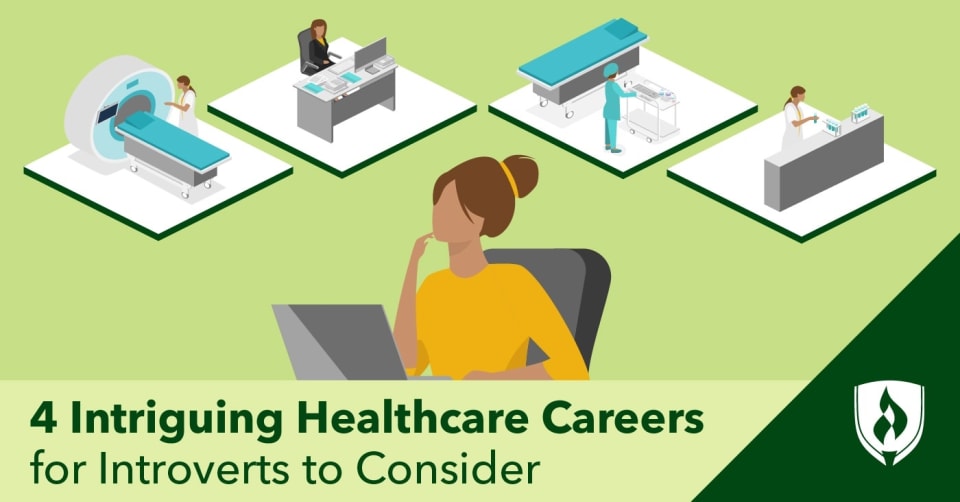
Working in a quiet environment is the ideal scenario for you. You’re perfectly content just focusing on your work without a ton of social stimulation. It’s not that you dislike interacting with other people—it’s just that too much of it makes you feel a strong urge to recharge alone. You’ve learned that situations involving too many people make you feel drained, and you’d rather not deal with that every single day at work.
When you look around at job options, healthcare keeps rising to the forefront of your mind. But are there good healthcare jobs for introverts?
It’s true that when thinking of healthcare careers, the nurses, medical assistants and pharmacy technicians that may immediately spring to mind seem to interact with people day in and day out. But don’t let that lead you to believe introverts can’t find a good fit in healthcare—there’s huge diversity of healthcare careers out there, and several options can mesh well with an introverted personality.
Pair that variety of roles with a healthcare field that’s continuing to grow—the Bureau of Labor Statistics (BLS) projects healthcare occupations to add approximately 2.6 million new jobs from 2020–2030—and that’s good news for you!1
4 Careers in healthcare for introverts
Like it or not, human interaction is obviously going to play a role in every career—there’s no escaping it. But that doesn’t mean you need to be stuck in a healthcare role that forces you to be “on” socially at all times. These positions typically offer a balance that most introverted people can thrive in:
1. Medical lab technician
Have a knack for science? Did you love biology class in high school? Medical lab technicians work in a laboratory with all the test tubes and advanced technical equipment a chemistry or biology fan could wish for. They play an important role in saving the lives of patients, but instead of working with them face-to-face, they’re in the lab taking care of important diagnostic work like analyzing samples of blood and tissue.
Why it’s a good job for introverts: The behind-the-scenes nature of this position can be the perfect fit for an introvert. Whether you work in a hospital or clinic, the medical labs are set apart from patients and the general hubbub of the facility.
You’ll also be able to maintain a sense of independence in the lab while testing samples that are essential to diagnosis. While you’ll likely work under the supervision of a lab manager, much of your work will be done independently in the peace and calm of the secluded lab.
Job outlook: Employment of clinical lab technologists and technicians is projected to increase at a faster-than-average rate of 11 percent from 2020 through 2030, according to the BLS.1 This projection is tied to the aging population and an anticipated need to test for medical conditions like cancer or type 2 diabetes.
Potential education pathway: Medical Lab Technician Associate’s degree.
2. Health information technician (and related roles)
If you have an interest in technology and working behind-the-scenes to keep key patient information flowing, you might want to look into health information technician (HIT) roles. Our healthcare system depends on health information professionals like medical coders, cancer registrars and health information technicians to accurately document and relay critical patient health and billing information.
Why it’s a good job for introverts: HITs focus their time and energy on healthcare documents and records. This is a great job for introverts, as you work primarily with organized systems and patient records rather than the patients themselves. That being said, some roles may require interaction and coordination between stakeholders like insurance carriers and healthcare providers.
Job outlook: Employment of medical records and health information specialists is projected to grow by a nine percent rate from 2020 through 2030, according to the BLS.1 Once again, the aging population and the prevalence of electronic health records will create continued demand for professionals who can maintain these systems.
Potential education pathway: Education requirements will vary for health information management, with undergraduate options ranging from a Medical Billing and Coding Certificate program to a Health Information Management Bachelor’s degree.
3. Radiologic technologist
If you’re looking for a job that comes with a unique point of view, you’re in the right place. Radiologic technologists are the medical professionals responsible for performing diagnostic imaging examinations on patients. This can include X-rays, MRIs and other advanced imaging methods.
Why it’s a good job for introverts: While this role does include some patient interaction in that you’ll work with them to explain the procedure and make sure they’re positioned correctly, it’s relatively limited and routine compared to many other patient-facing roles. You focus on getting the necessary images and making sure the patients are at ease—you’re not breaking bad health news to them or tackling other unpleasant social interactions.
Understanding the difference between a radiologist and a radiology tech can shed light on career pathways within the field.
Job outlook: Like many other healthcare careers, the job outlook for radiologic and MRI technologists appears fairly strong. The BLS projects employment of radiologic technologists and technicians to grow nine percent from 2020 through 2030.1 The healthcare industry overall is facing some strain keeping pace with a large aging population, and that holds true for this role.
Potential education pathway: Radiologic Technology Associate’s degree.
4. Surgical technologist
If you’re organized, good at staying composed under pressure and aren’t squeamish about blood, working as a surgical technologist could be a great fit for someone like you! These professionals play the critical role of assisting with surgeries, preparing and sterilizing the operating room and its equipment, and assisting surgeons during surgery.
Why it’s a good job for introverts: Surgical technologists will spend some time with patients but often when those patients are unconscious with anesthesia. They work with a limited number of people to keep numbers in the operating rooms small, and much of their day involves maintaining the surgical environment. There’s typically plenty of quiet, hands-on time where chitchat is discouraged since everyone needs to focus. That said, you will want to keep a strong working relationship with the surgical team.
Job outlook: Employment of surgical technologists is projected to grow nine percent from 2020 to 2030, according to the BLS.1 This is due in part to the aging population that will likely require more surgeries like joint replacements or cataract removals as they get older—as well as advances in surgery that make it a safer, more viable option for certain illnesses and problems.
Potential education pathway: Surgical Technologist Associate’s degree.
The lesser-known jobs in healthcare
Many people fail to realize these medical careers exist because these professionals tend to fly under the radar when they’re making a visit to a clinic or hospital. But now you know about these opportunities in healthcare that could be an ideal match for your personality. Healthcare is a broad field, and there are plenty of jobs for introverts that could be stable, interesting and not too much of a drain on your figurative social battery.
Did one of these options stand out to you in particular? Learn more about what opportunities lie ahead in these four careers:
- Could a career in the lab be in your future? Learn more about these behind-the-scenes professionals with our article “ What Does a Medical Laboratory Technician Do?”
- Think a health information role may be the route for you? Take a deeper dive into these roles with “Health Information Career Paths: Exploring Your Potential Options.”
- Did the work of a radiologic technologist catch your attention? Check out our article “7 Appealing Advantages of Being a Radiologic Technologist.”
- Did the surgical technologist role sound interesting? Check out our article “6 Enticing Reasons Why Becoming a Surgical Technologist Is Worth It.”
1Bureau of Labor Statistics, U.S. Department of Labor, Occupational Outlook Handbook, [information accessed March 2022] www.bls.gov/ooh/. Employment conditions in your area may vary.
EDITOR’S NOTE: This article was originally published in 2015. It has since been updated to include information relevant to 2022.




